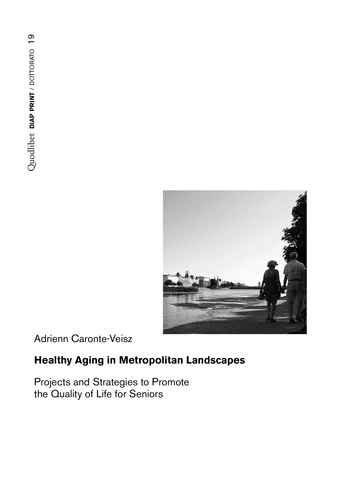Healthy Aging in Metropolitan Landscapes. Projects and Strategies to Promote the Quality of Life for Seniors
Par :Formats :
Disponible dans votre compte client Decitre ou Furet du Nord dès validation de votre commande. Le format PDF protégé est :
- Compatible avec une lecture sur My Vivlio (smartphone, tablette, ordinateur)
- Compatible avec une lecture sur liseuses Vivlio
- Pour les liseuses autres que Vivlio, vous devez utiliser le logiciel Adobe Digital Edition. Non compatible avec la lecture sur les liseuses Kindle, Remarkable et Sony
- Non compatible avec un achat hors France métropolitaine
 , qui est-ce ?
, qui est-ce ?Notre partenaire de plateforme de lecture numérique où vous retrouverez l'ensemble de vos ebooks gratuitement
Pour en savoir plus sur nos ebooks, consultez notre aide en ligne ici
- FormatPDF
- ISBN978-88-229-1300-5
- EAN9788822913005
- Date de parution23/02/2022
- Protection num.Adobe DRM
- Taille34 Mo
- Infos supplémentairespdf
- ÉditeurQuodlibet
Résumé
Aging demographics and urbanization are two of the most important social
tendencies facing the world's developed countries. Today cities must adjust
if older people are to maintain quality of life. The age-friendly city is a city
suitable for everyone. The rewriting of the urban landscape with the elderly
in mind might be the key to urban regeneration.
This research strives to build bridges between cognitive psychology and
landscape architecture in order to promote senior citizens' well-being in the
metropolis.
It proposes a critical reflection on how urban landscapes, designed with evidence-based methodology can promote the psycho-physical welfare of the inhabitants, with particular focus on one of the most vulnerable groups. High quality neighbourhood green space is associated with mental health benefits, prevention of cognitive decline and dementia, reduced cardiovascular morbidity and mortality, etc.
However, the evidence base, related to healthy urban greenery, is poorly integrated in the planning, management and design of urban green spaces. Through a global current design practice analysis and the comparison of two European case studies (Copenhagen and Rome), analysed with quantitative and qualitative approaches, an Age-friendly Urban Nature Index was developed that aims to provide a tool for landscape architects and local decision makers to support future urban planning and design.
It proposes a critical reflection on how urban landscapes, designed with evidence-based methodology can promote the psycho-physical welfare of the inhabitants, with particular focus on one of the most vulnerable groups. High quality neighbourhood green space is associated with mental health benefits, prevention of cognitive decline and dementia, reduced cardiovascular morbidity and mortality, etc.
However, the evidence base, related to healthy urban greenery, is poorly integrated in the planning, management and design of urban green spaces. Through a global current design practice analysis and the comparison of two European case studies (Copenhagen and Rome), analysed with quantitative and qualitative approaches, an Age-friendly Urban Nature Index was developed that aims to provide a tool for landscape architects and local decision makers to support future urban planning and design.
Aging demographics and urbanization are two of the most important social
tendencies facing the world's developed countries. Today cities must adjust
if older people are to maintain quality of life. The age-friendly city is a city
suitable for everyone. The rewriting of the urban landscape with the elderly
in mind might be the key to urban regeneration.
This research strives to build bridges between cognitive psychology and
landscape architecture in order to promote senior citizens' well-being in the
metropolis.
It proposes a critical reflection on how urban landscapes, designed with evidence-based methodology can promote the psycho-physical welfare of the inhabitants, with particular focus on one of the most vulnerable groups. High quality neighbourhood green space is associated with mental health benefits, prevention of cognitive decline and dementia, reduced cardiovascular morbidity and mortality, etc.
However, the evidence base, related to healthy urban greenery, is poorly integrated in the planning, management and design of urban green spaces. Through a global current design practice analysis and the comparison of two European case studies (Copenhagen and Rome), analysed with quantitative and qualitative approaches, an Age-friendly Urban Nature Index was developed that aims to provide a tool for landscape architects and local decision makers to support future urban planning and design.
It proposes a critical reflection on how urban landscapes, designed with evidence-based methodology can promote the psycho-physical welfare of the inhabitants, with particular focus on one of the most vulnerable groups. High quality neighbourhood green space is associated with mental health benefits, prevention of cognitive decline and dementia, reduced cardiovascular morbidity and mortality, etc.
However, the evidence base, related to healthy urban greenery, is poorly integrated in the planning, management and design of urban green spaces. Through a global current design practice analysis and the comparison of two European case studies (Copenhagen and Rome), analysed with quantitative and qualitative approaches, an Age-friendly Urban Nature Index was developed that aims to provide a tool for landscape architects and local decision makers to support future urban planning and design.




